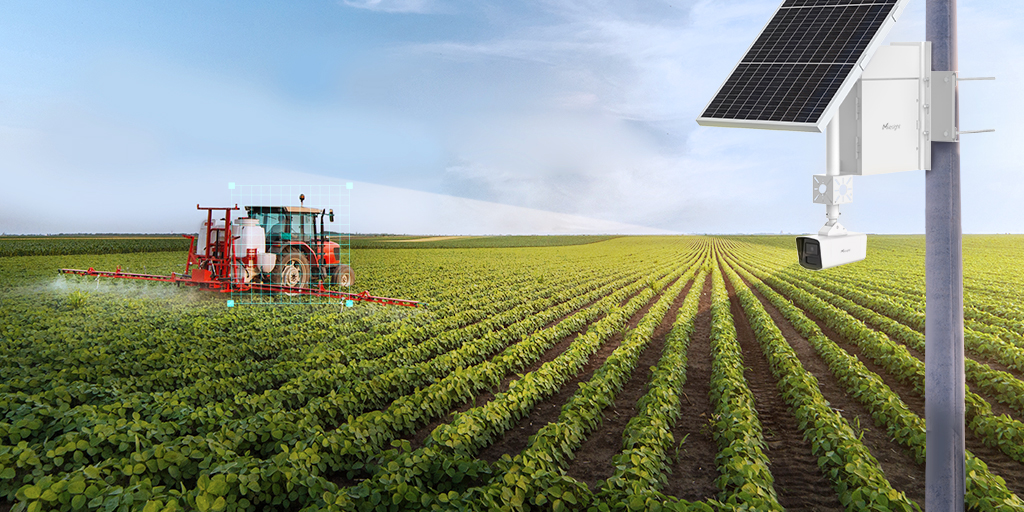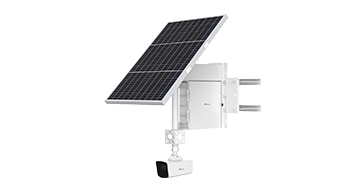Farm Surveillance Upgraded:
How to Choose Farm Security
Cameras Without WiFi

The cost of theft in rural communities is growing. According to NFU Mutual's latest figures, the cost of rural crime increased by 4.3% year-on-year in 2023, reaching £52.8m, as criminal gangs targeted farmyards and fields looking to cash in on continuing high inflation and ready resale markets domestically and overseas. For large properties and outdoor environments, especially in rural areas, a robust security solution is crucial to ensure comprehensive surveillance across vast and challenging terrains. So, how do you choose the right cameras for your farm to ensure peace of mind?
Why Traditional WiFi and Wired Security Cameras Fall Short on Farms
Many farmers face a common challenge: standard WiFi-dependent security systems are poorly suited for vast agricultural properties. Rural locations often suffer from:
Connectivity Challenges:
- Inconsistent or non-existent WiFi coverage across large acreage and long-range property sections
- Dead zones behind metal buildings and grain bins in outdoor environments
- Weather-related connectivity interruptions and limited power access in rural and remote areas
Practical Limitations:
- Prohibitive installation costs for running cables across large properties
- Limited flexibility for repositioning cameras as security needs evolve
- Complex maintenance requirements, especially in harsh agricultural environments
Key Factors in Choosing Farm Security Cameras
When protecting a farm, especially those in remote areas, selecting the right security camera system is crucial. Here are some key factors to consider:
Wireless vs. Wired
The first decision is whether to choose wireless or wired security cameras. Wireless cameras are generally easier to install and offer greater flexibility in placement. This is particularly important in rural areas where extensive wiring may not be practical. However, if you opt for wireless cameras, ensure they can operate without a WiFi network, especially if your farm lacks reliable internet access.
Advantages of Wireless Cameras:
- Quick and non-invasive installation without extensive wiring
- Flexible placement and easy relocation without being limited by the length of cables
- Easily expandable system coverage
- Minimal disruption to daily farm operations
- Reduced vulnerability to physical cable damage
- Lower installation costs compared to wired systems
- Ideal for temporary or seasonal monitoring needs
Considerations for Wired Cameras:
While wired systems have their place in farm security, they come with specific limitations:
- Requiring professional installation and higher upfront costs
- Limited by cable length restrictions
- Vulnerable to environmental damage
- Complex maintenance and repair procedures
- Difficult to modify after initial installation
Wired cameras often provide a more stable and reliable connection, as they are not subject to wireless interference. They may be more suitable for areas with a consistent power source.
Power Options
Reliable power sources can be a challenge in remote areas. Solar power represents the pinnacle of self-sufficient farm surveillance. These systems combine high-capacity solar panels with advanced battery storage to ensure continuous operation, even during periods of limited sunlight. For farms in sunny regions, solar power eliminates the need for complex wiring infrastructure while providing reliable, year-round operation.
Modern solar-powered cameras incorporate sophisticated power management systems that optimize energy consumption based on usage patterns and available sunlight. The latest solar security systems include built-in battery backup systems that can power cameras for up to several weeks without sunlight, ensuring continuous coverage during overcast weather or seasonal changes.
Night Vision Capabilities
Since many thefts occur after dark, night vision is a critical feature of farm security cameras. Ensure the cameras you select have strong night vision capabilities, allowing you to effectively monitor your property around the clock.
-
Infrared (IR) LEDs: These enable cameras to see in complete darkness. Look for cameras with a higher number of IR LEDs for better night vision range.
-
Low-Light Sensors: Some cameras are equipped with sensors that can capture color images in low-light conditions, providing better detail than traditional black-and-white night vision.
Storage Options
Consider how the video recordings will be stored. Some cameras offer local storage options, such as SD cards, while others use cloud storage. For areas with limited internet access, local storage may be more reliable. These systems allow for immediate footage review without waiting for downloads or streaming, and they eliminate monthly cloud storage fees. However, physical storage devices require periodic maintenance, including regular backups and potential card replacements.
For farms with reliable cellular connectivity, cloud storage offers significant advantages for footage management. These services typically offer tiered storage plans based on retention periods and camera counts, allowing farms to scale their storage needs as their security systems expand. Many services offer automated backup features and remote access capabilities, allowing farmers to review footage from any location using mobile devices or computers.
Smart Features
Modern farm security systems have evolved far beyond simple recording devices, incorporating sophisticated smart features that enhance surveillance effectiveness while reducing manual monitoring requirements. For example, motion detection triggers recording and alerts when movement is detected, reducing the need to review hours of footage. Audio alarms enable communication with visitors or intruders through the camera.

Durable Design for Harsh Environments
Farms are exposed to various harsh environmental conditions, making it crucial to select security cameras designed to withstand these elements. Here are the key features that ensure durability:
Weatherproof Housing
Cameras with an IP67 rating are fully protected against dust and can withstand immersion in water up to 1 meter deep for 30 minutes. This ensures they remain working during heavy rain and dusty conditions.
Vandal Resistance
For areas prone to tampering or vandalism, cameras with an IK10 rating offer robust protection against physical impacts, ensuring they remain intact and working even when subjected to force.
Wind Resistance
Choose cameras that can withstand high wind speeds, up to 12 on the Beaufort scale (hurricane-force winds), ensuring they stay in place and function during extreme weather events.
Signal Range
When protecting large agricultural properties, the signal range becomes a critical consideration for effective surveillance. Traditional security cameras often struggle to maintain consistent coverage across expansive rural landscapes. Look for cameras with extended transmission capabilities, particularly cellular or long-range wireless systems that can reliably cover distances up to several hundred acres.
Key signal range considerations include:
- Transmission distance capabilities
- Ability to penetrate physical obstacles like metal structures, tree lines, and terrain variations
- Signal strength in different weather conditions
- Compatibility with cellular networks or long-range wireless protocols
Mounting Flexibility
The ideal security system should offer maximum mounting flexibility, allowing quick repositioning and installation across various farm environments.
Important mounting considerations include:
- Versatile mounting options (pole mounts, wall mounts, temporary stands)
- Easy-to-adjust mounting mechanisms that don't require extensive tools
- Compatibility with different surface types (metal buildings, wooden structures, fence posts)
- Quick-release systems for seasonal repositioning
- Lightweight design that minimizes structural stress
Modern wireless and solar-powered cameras excel in mounting flexibility. These systems eliminate the constraints of wired connections, allowing farmers to:
- Rapidly deploy cameras to new locations
- Monitor seasonal storage areas
- Adjust surveillance points based on changing security threats
- Minimize installation complexity
- Reduce overall system implementation costs
Cellular Security Cameras: Advancing Rural Farm Surveillance
Modern cellular-based security cameras have transformed farm monitoring by eliminating the need for WiFi infrastructure. These systems harness existing cellular networks to transmit security footage and alerts, eliminating the traditional constraints of local WiFi infrastructure and enabling truly flexible surveillance solutions for agricultural properties of any size.
Modern cellular security cameras can maintain reliable connections hundreds of acres from their base stations, ensuring comprehensive long-range monitoring across large properties without complex WiFi infrastructure. This extensive range proves particularly valuable for monitoring remote equipment storage areas, distant fence lines, and isolated livestock pastures in rural settings.
Cellular technology's reliability in agricultural settings stands out as a crucial advantage. Unlike traditional WiFi systems that struggle with signal interference from metal buildings and agricultural equipment, cellular signals maintain consistent connectivity across varying terrains and through different types of farm structures. This reliability ensures continuous surveillance even in challenging environmental conditions, providing farmers with dependable security coverage when needed.
Implementing cellular security systems offers remarkable flexibility in camera placement and system expansion. Farmers can position cameras wherever security concerns exist, without worrying about WiFi signal strength or cable routing. This adaptability allows for rapid response to changing security needs, whether monitoring seasonal crop storage areas or temporarily securing construction sites on the property.
Go Green with Wireless Farm Security Cameras
Environmental sustainability in agricultural operations extends beyond crop and livestock management to security infrastructure. Choosing wireless security cameras powered by solar panels is not only a practical choice but also an environmentally friendly one.
Solar-powered systems eliminate the need for traditional grid power, reducing both energy costs and environmental impact. Wireless security solutions minimize environmental disruption by eliminating the need for extensive trenching and cable installation. This combination ensures continuous surveillance while minimizing your carbon footprint.
Conclusion
Implementing farm security cameras without WiFi doesn't mean compromising on functionality. Today's wireless farm security cameras offer robust solutions that meet the unique challenges of agricultural environments and extensive outdoor properties. By carefully evaluating your needs and choosing the right system with long-range monitoring capabilities, you can create a comprehensive security solution that protects your farm assets effectively across large rural areas.
Frequently Asked Questions
Are there any hidden costs associated with solar-powered cameras?
Generally, the upfront cost of purchasing the camera and solar panel is the primary expense. There are no ongoing electricity costs due to solar power usage.
Can users access the video footage remotely and check remote locations?
Yes, most off-grid security cameras come with mobile apps or web interfaces that allow you to access live footage and recorded videos remotely. You can place these cameras anywhere without worrying about cable lengths. They use 4G LTE connections, so they don't require traditional wiring.
Can farm security cameras without wifi be integrated with other security systems?
Many off-grid security cameras can be integrated with other security systems and smart home devices. Look for models that support common integration protocols like ONVIF or have APIs that allow for custom integrations.
Milesight Related Products

4G Solar-powered Security Camera
Offer reliable, solar-powered surveillance, ensuring continuous security with 4G connectivity.
Explore MoreIf you are interested in Milesight, please leave us a message.
Contact Us
Contact Us
Contact Us to Get More Information




